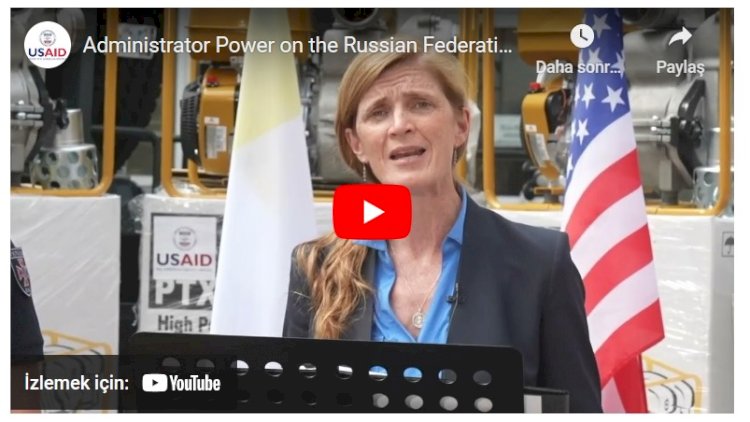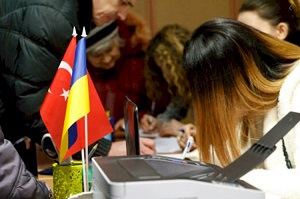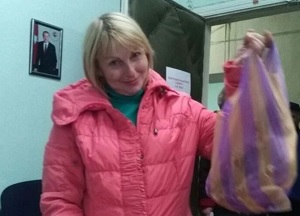Administrator Samantha Power Speaks to Press at the State Emergency Service of Ukraine Headquarters
HEAD OF THE STATE EMERGENCY SERVICE OF UKRAINE SERHIY KRUK

Administrator Samantha Power Speaks to Press at the State Emergency Service of Ukraine Headquarters
ADMINISTRATOR SAMANTHA POWER: Good afternoon everybody. It is great to be back in Ukraine. Before I reflect on the incredible partnership that we have with SESU and our humanitarian efforts here in Ukraine, I want to start by expressing grave dismay with the Russian Federation’s decision to withdraw from the Black Sea Grain Initiative. This is a reckless decision that will have profound human consequences. And it's just another example of Russian callousness and disregard for human lives and livelihoods – not only here in Ukraine but all around the world.
Since the deal began last summer, more than 32 million metric tons of grain and oilseed were exported through the Black Sea Grain Initiative. I have seen firsthand in my travels around the world how much this matters. I have had the experience of greeting a ship in a Beirut port filled with Ukrainian wheat. I have been to Somalia, to Kenya, to Egypt – countries that are major recipients of Ukrainian wheat, and which prior to Putin’s blockade, at the beginning of the full-scale invasion last year, got the majority of their wheat from this region.
Again, the human consequences of a decision to deny food to the world's most vulnerable are devastating. And no matter what you hear from Moscow, let us be clear about what the Black Sea Grain Initiative achieved. Two-thirds of the wheat that was exported via that initiative went to developing countries. 55 percent of the commodities exported overall through the Black Sea Grain Initiative went to lower-income countries. So in addition to the Ukrainian farmers who will pay a price, it is people all around the world who are going to be worse off because of this reckless decision.
Now, I want to thank Serhiy, our great partner and SESU, for an invaluable partnership. SESU is famous now all over the world for its life-saving rescue work. All around the world, we know about the bravery of Ukraine's first responders. Firefighters who charge into burning buildings in order to rescue vulnerable children. Technicians who navigate minefields to remove deadly explosives. Medics conducting search and rescue operations after missile attacks, so as to treat survivors in the golden hour.
We heard from Serhiy about the devastating human toll on the SESU workforce doing this work. They put their lives on the line every day and some have made the ultimate sacrifice.
Last month, we saw the devastating floods because of the attack on the Kakhovka Dam and we saw the biblical toll taken on the communities around Kherson. At least one million people lost access to clean drinking water as the dam’s collapse drained their core resource and at least 28 Ukrainians, as we know, lost their lives.
We know that that loss of life would have been even greater, if not for SESU’s first responders who conducted life-saving rescue, facilitated evacuation, and to this day are still providing crucial psychological support to those whose neighborhoods and livelihoods have been washed away.
USAID invests in SESU and we think it is one of the wisest investments that we can make on behalf of Ukrainian people but also on behalf of the American people. Around $1.2 billion of Direct Budget Support disbursed to the Government of Ukraine has gone toward reimbursing the salaries of more than 57,000 first responders, including many who responded to the destruction of the Kakhovka Dam.
SESU shows everyday the skill and bravery for which the Ukrainian people are known worldwide. But along with skill and bravery, SESU also needs equipment. I am thus today pleased to hand over an additional $2.3 million worth of equipment which will help SESU repair the damage inflicted by Russia's forces on Ukraine's critical infrastructure.
These six tanker trucks will deliver clean drinking water to communities cut off from supplies. More than 450 trailer sewage and floating motor pumps are on their way to the Kherson region branch of SESU to help with the ongoing recovery from the effects of the floodwaters.
Once the impact of the dam’s destruction has been addressed in the Kherson region, SESU will distribute these pumps to other regions in need. Ukraine has major humanitarian needs that are going to continue as long as Putin continues to wage this war. This equipment and our support for the salaries of first responders help meet some of those needs.
But today I also would like to announce that the United States will provide more than $500 million in additional humanitarian assistance to our humanitarian partners to scale up their response on the frontlines.
Building on the support that we have been providing since Russia's first attacks back in 2014 and its occupation and surging additional support on top of what we have provided since the full-scale invasion last year, the United States intends to use these resources to help Ukraine meet the needs that Ukrainians identified for themselves.
This will support everything from shelter for those whose homes have been destroyed to trauma support for those who have been most affected by the war. We see what is happening in Ukraine: Russia continues to burn, Ukraine continues to build.
It's our privilege, as the United States and as representatives of the American people, to support our Ukrainian partners as they do that building. Building infrastructure, rebuilding communities, rebuilding lives, and building a stronger and more prosperous Ukraine for the future. With that, I’m happy to take a couple of questions.
HEAD OF THE STATE EMERGENCY SERVICE OF UKRAINE SERHIY KRUK: I would like to say a couple of words if I may. I would like to thank you very much, Administrator Power. You have really provided a very good characteristic, a very deep dive characteristic of the work of SESU Ukraine. And that really is very important because if you know what this service does, and what are the duties and functions, you really know what to do with them. And definitely I must say that our cooperation with USAID and support from the American government to Ukraine makes us stronger. We are on the path to our victory and we do it together, and as I mentioned, when we are united we can not be defeated. Thank you very much.
Administrator Power, I would like to present you this book. It contains a lot of information about the operations of SESU, and the photos were actually taken by the people [photographers and first responders] in the sites, in the fields.
ADMINISTRATOR POWER: Thank you. Alright.
QUESTION: Administrator Power, on the Grain Initiative, is there any indication or hopes that it can be revived? Is there a dialogue still ongoing in Washington talking with Moscow?
ADMINISTRATOR POWER: Well, we have publicly, today, and for weeks in advance of today’s reckless decision, called on the Russian Federation to reverse course. In advance of today, of course, they had made quite clear in public statements that this was their intention. And we would expect, as well, voices from the communities who are likely to be most affected to be heard today, both publicly and behind the scenes in appealing for a reversal of this decision. Of course, we give great credit to President Erdoğan and UN Secretary General António Guterres, who did the painstaking diplomacy with support from others in advance of last summer's initial deal. And, of course, that deal has been on life support at different times over these last months, but reason and pressure have in the past prevailed. So far we don't see an indication of an inclination on Russia’s part to reconsider.
And I might just note, that today is also the ninth anniversary of the Russian shootdown of the Malaysian Airlines jet, and would just like to extend my condolences as well to the loved ones of those who were killed in that attack – of which Russian forces were found to be responsible. But I can't help but think of the two together, not only because the anniversary falls on the same day that they're pulling out of the Black Sea Grain Initiative, but they are both examples of cruelty inside Ukraine, whose cruel impact extends well beyond Ukraine.
And, again, we appeal on behalf of all whose livelihoods are affected here in Ukraine, which we know Putin doesn't care about, but as well, the lives of people across developing countries who depend on this wheat, and who depend on global food prices to continue to go down because every month since the Black Sea Grain Initiative has been operable, you have seen a steady decrease in cereal prices around the world – and that is not a coincidence.
So USAID has done contingency planning to try to support our partners in vulnerable communities in countries around the world. And, I will stress, we’ve done really important work supporting the creativity and ingenuity of Ukrainian planners, and engineers, and farmers in developing other routes to get Ukrainian goods to market. And so we will now, for as long as this is suspended or not operable, we will work to support Ukrainians in other channels for export.
QUESTION (via translation): For the equipment suggested and provided for the State Emergency Services of Ukraine, what are the plans for them, what are the regions, what will be done?
KRUK: This was not the first batch of support provided to the State Emergency Service of Ukraine from the USAID. Everything that has been already provided, and everything that will be provided to the State Emergency Services of Ukraine, is being used very effectively in the regions and will be used very effectively in the regions that were affected.
The equipment and the vehicle that we currently have received including equipment to provide the response to flooding situation as well as to provide transportation affordable, and technical water in those regions were mostly affected by flooding situation. Therefore, in just a couple of days this equipment will be effectively used in all these regions: Kherson region, Kherson Oblast, Mykolaiv Oblast, Dnipro, Dnipropetrovsk Oblast, and all other regions and communities that need it.
And now speaking of needs, we do have needs, that’s true. But let me tell you that as of today, the State Emergency Service is capable of effective performance of its duties and responsibilities, provision of support to the Ukrainian population due to support and assistance from the Ukrainian government, Ukrainian President, and support from our international partners. And definitely, we are quite hopeful for the very fruitful cooperation in our joint matter and definitely, when I say cooperation, I mean cooperation with USAID.
QUESTION: You mentioned that you are working on alternative ways to export Ukrainian products and goods, could you please elaborate more about this?
ADMINISTRATOR POWER: Thank you. So, first of all when the war broke out, we started a new initiative at USAID called AGRI-Ukraine. And through AGRI-Ukraine, we have supported a dramatic expansion in storage capacity for Ukrainian farmers, making sure that they have additional access to financing, additional access to seeds, to fertilizer, and to crop insurance.
We invested $100 million in AGRI-Ukraine. And then we mobilized a whole number of commitments as well from the private sector, as well as from other governments, to support Ukrainian agriculture.
AGRI-Ukraine has already reached 32 percent of Ukraine's registered farmers with seeds, fertilizer, crop protection, storage, access to financing, or other support.
We have recently announced an additional $250 million in support for the agricultural sector in Ukraine, and that will continue the support that I have mentioned but also continued support for what you have asked about – which is these different export channels.
So, we are working with Ukrainian farmers and with the government to look at what additional changes need to be made – not only inside Ukraine in terms of Danube River ports, roads, transshipment, or rail – but also in other nearby countries.
And here's the key statistic, since July of last year until today, these alternative routes have moved around 36 million metric tons. That is an 800 percent increase from the amount of food that moved on those alternatives routes before.
This is like so much of what is true about this war in Ukraine, which is that Putin does something reckless and cruel, and Ukrainians respond by making themselves more resilient, by diversifying their partnerships and their methods, and ultimately positioning themselves to be even stronger after the war.
We are determined to stand with Ukrainian farmers as they continue to seek to get their goods to market and to get their goods to hungry people all around the world.
Thank you.






































